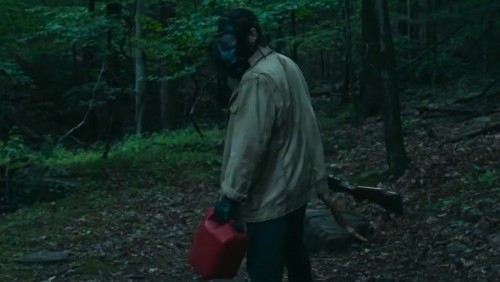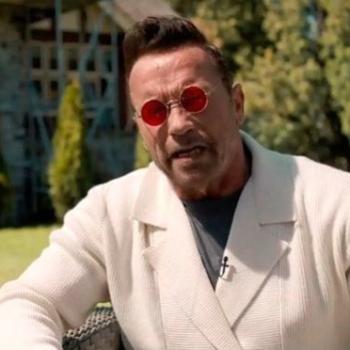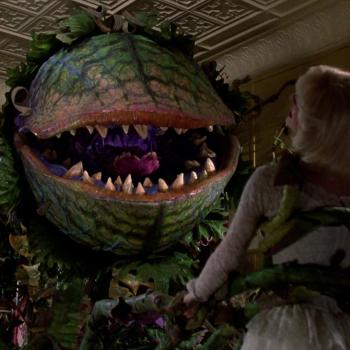Last year’s “Krisha” was one of the most astounding directorial debuts I’ve seen. A disorienting, visually and aurally spectacular domestic drama told through the lens of a thriller, I was immediately a fan of writer-director Trey Edward Shults. The film’s unnerving tone made me eager for his return behind the camera with the full-fledged horror movie, “It Comes at Night.”
Be careful what you wish for.
Shults’ sophomore effort cements his reputation as a visual maestro, capable of creating a dread-soaked atmosphere and ratcheting tension. But “It Comes at Night’s” striking imagery is married to turgid pacing and a confused script that doesn’t know what to do with its themes of grief, paranoia and fear. It’s striking, but ultimately empty.
The film begins with a haunting scene in which a family gathers to say goodbye to its patriarch (David Pendleton). Breathing in ragged gasps, with sores across his face, he sits in his bedroom behind sheets of clear plastic. His daughter Sarah (Carmen Ejogo) says farewell through a gas mask. Shortly after she’s made her peace, Sarah’s husband Paul (Joel Edgerton) and their son Travis (Kelvin Harrison Jr.) load the man into a wheelbarrow, take him outside, shoot him and set his body ablaze.
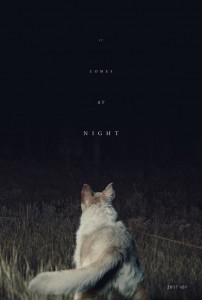 It’s the coldest of cold openings, plunging us into a world where an unexplained virus has ravaged the land. Sarah, Paul and Travis huddle in their home with the windows boarded up and rifles ready, isolating themselves from anyone who might carry the sickness. One night, they’re jolted awake when Will (Christopher Abbott) breaks in, scrounging for supplies to take care of his family. Sarah urges Paul to have the newcomers join them; he reluctantly agrees. Will brings along his wife, Kim (Riley Keough), and their infant son and for awhile the makeshift family lives in peace. But simmering beneath everything is fear, paranoia and a desperation for Paul to protect his family at all costs. From the start, we know things won’t end well.
It’s the coldest of cold openings, plunging us into a world where an unexplained virus has ravaged the land. Sarah, Paul and Travis huddle in their home with the windows boarded up and rifles ready, isolating themselves from anyone who might carry the sickness. One night, they’re jolted awake when Will (Christopher Abbott) breaks in, scrounging for supplies to take care of his family. Sarah urges Paul to have the newcomers join them; he reluctantly agrees. Will brings along his wife, Kim (Riley Keough), and their infant son and for awhile the makeshift family lives in peace. But simmering beneath everything is fear, paranoia and a desperation for Paul to protect his family at all costs. From the start, we know things won’t end well.
As far as concepts for horror movies go, it’s a helluva good one. There are numerous opportunities for betrayal, tragedy, stark horror and suspense. But Shults’ script is in love with ambiguity. It’s not enough just to withhold where the virus came from or what its symptoms look like (and, indeed, perfectly fine to do so). But Shults lets the film meander through countless nightmare sequences that hint at more than is ever revealed. He introduces a theme of Travis’ repressed sexuality and burgeoning lust toward Kim, but lets it deflate after one scene. There’s a red door that’s supposed to remain closed all through the night; it’s no surprise that one night someone finds it jarred open and bad things happen, but the film never provides any closure to who might have opened it or why; instead, it abandons the question altogether as it rushes toward its climax.
The majority of the film follows the home’s residents through their day-to-day routine as they strive to live together and adapt to this new life. There’s a simmering resentment as Paul watches Will teach his son how to behave like an adult, but other than that, there’s no real conflict between the characters until the film hits its third act and rushes through its tragic denouement. It’s mired in the aches of grief, but has nothing to say about it, nor does Shults know whether he wants to examine issues of trust, parental responsibility or survival. The film just muddles along until it’s time to wrap things up. Even the title “It Comes at Night” is confusing. Aside from a mention that everyone stays inside at night, presumably for safety, there’s never a mention of anything bad happening in the dark, be that a monster, illness or looters. Its most tense confrontations occur in daylight.
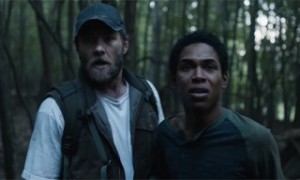 I’m not against ambiguity and, indeed, too many of today’s horror movies over-explain their premises, robbing audiences of the opportunity to be terrified by the unknown. And it’s possible that Shults, who wrote the script while reflecting on the death of his father, was dealing with feelings and experiences that can’t be easily conveyed through exposition, or even with a subject that those who haven’t dealt deeply with grief understand. Maybe I’m missing something, and perhaps this movie plays better for those with a more personal connection to its themes.
I’m not against ambiguity and, indeed, too many of today’s horror movies over-explain their premises, robbing audiences of the opportunity to be terrified by the unknown. And it’s possible that Shults, who wrote the script while reflecting on the death of his father, was dealing with feelings and experiences that can’t be easily conveyed through exposition, or even with a subject that those who haven’t dealt deeply with grief understand. Maybe I’m missing something, and perhaps this movie plays better for those with a more personal connection to its themes.
But I can only write of my experience with “It Comes at Night” and it’s that the film is so committed to keeping audiences in the dark that it stubs its own toes. We don’t spend enough time with the three family members at the beginning to understand their dynamics and the resentments that might be building. We’re never given enough information on the new arrivals to know whether we should fear them or take them at their word; and if that uncertainty is the point, the movie never truly exploits it. There’s a moment where it appears Will might be hiding information about his past, but the film never revisits it. Aside from one intense dream, the film never enters much into how Travis feels about the new arrivals, and the film’s final conflict escalates so quickly that we’re left with a baffled “what just happened” instead of a horrified “WHAT JUST HAPPENED??” The movie ends on what could have been a gut punch, but instead keeps ambling through to a final shot that is sad, yes, but carries no deeper meaning. Whatever Shults wants to say gets lost in a fog, and the movie is listless and befuddling instead of stark and unnerving. I feel like the concept might have worked better as a short film, with Travis’ dreams excised and the ending more definitive.
It’s a shame that the script is such a disappointment, because Shults’ technical mastery is on point. Filming in largely natural light, with only lanterns or candles to provide illumination in many scenes, he drenches the film in dread. The home’s shadowy corners and the muffled sounds coming from all directions create a claustrophobic setting, and the characters’ navigation through it is often tense and suspenseful. The sound design is amazing, with hushed voices rising through the rafters, creaks coming from around the corner and loud bangs suddenly interrupting the silences. The cast is also strong, particularly Edgerton, who brings to life the various conflicts raging in Paul — survival, morality, love and paranoia. It’s all on his face as the movie unfolds. I just he had clearer waters to navigate.
We’re at a time where horror is mingling with prestige, to very intriguing results. “The Babadook,” “It Follows,” “The Witch” and “Get Out” proved that you can deliver scares without sacrificing intelligence, and that capable filmmakers can still create terror without having to hack through nubile teens or depend on tired ghost stories. The best horror movies these days get under your skin and into your brain. And make no mistake, Shults is a talent who could one day make one of those films. But “It Comes at Night” is not it, no matter how much it thinks it might be. Is a sophomore stumble from a director I have no doubt will right himself on his next go-round.

